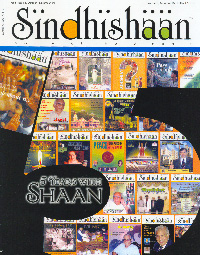SINDHIS AND THEIR LANGUAGE – SINDHI
by Rita Sahani

Subconscious plays a vital role in our lives. According to - Sigmund frued “Much of our emotional life, feelings that stir within us do not cross the threshold of awareness. Emotions that simmer beneath the shield of awareness can have a powerful impact on how we perceive or react even though we have no idea that they are at work.”
At the time of Partition of India in 1947, I was thirteen years old and my subsequent years were spent in non-Sindhi atmosphere of Lucknow, where I had no Sindhi friends to communicate with. After my marriage in 1957, I moved to Pune and at that time I was too engrossed with my personal family life. Looking after my family and child-rearing took away all my time and I had no time to think of my Sindhi origins, identity, language and culture; as I was busy moving around in non-Sindhi circles.
How did it happen that all of a sudden I started writing in Sindhi? It was as if a volcano had erupted inside me on account of my childhood memories and nostalgic feelings. It was indeed the work of my subconscious mind.
The psychologists say, “What an infant sees with his eyes in the first few months of his life has a permanent influence on his later life and emotions.” This is applicable to the birds and beasts too.
So those thirteen years of my childhood must have left permanent imprints on my emotions and mental being without my knowledge.
Yes, I had genetically strong literary background. My great grandmother, wife of Dewan Shewakram Malkani, was a mausi (Maternal aunt) of Parmanand Mewaram - the one and only compiler of that time of Sindhi Dictionaries (Sindhi to English and English to Sindhi). Professor M. U. Malkani (my paternal uncle) in his Sindhi article, 'Sindhi Adaba Ja Char Thumba' (Four pillars of Sindhi Literature) has quoted Parmanand saying, “In Hyderabad Sindh there are two ladies-my mother and my mausi, who have the richest vocabulary of Sindhi language and are store-houses of Sindhi Idioms and Similes. Whenever I visit them I always carry a small notebook with me and keep on jotting down the precious words uttered by them while conversing with me. I am proud to say that his mausi was my great grandmother.
It seems that genetics have played their part in taking out the best out of my psyche as far as Sindhi language is concerned.
Yes, Sindhi is a sweet and lyrical classical language with 52 letters in the alphabet which no other language has. Unfortunately in the absence on any province of our own-as a result of the partition of India, we are scattered not only in India, but throughout the world. Sindhi youth has no incentive to learn their mother-tongue as it does not serve any purpose for them or provide any financial stability to them. It has become only the language of old people, who were in their teens at the time of partition and the number of those people is dwindling slowly and steadily. So the future of Sindhi language in India (for Indian Sindhis) is not so bright and the situation seems to be quite depressing.
But my visit to Sindh-Pakistan in 2001 has brought a ray of hope in my outlook. It was heartening to see that Sindhi language is flourishing in Sindh, which is a natural phenomenon. Not only are there well established Universities, Colleges, Schools, Scholars, Academicians, writers and poets but the common man, urban or rural, speaks Sindhi, reads & writes in Sindhi, loves Sindhi and cherishes Sindhi with his heart and soul. After the publication of three of my books, the response and the feedback received form the common reader is so overwhelming, heartening, encouraging and rewarding that I have changed my opinion about the future of Sindhi language and my heart is filled with hope and optimism. It may not have any future in India but is at least animatedly alive and thriving in its own native land. Heavy books on History of Sindh, Encyclopedias, Dictionaries, Translations of English Research books on the subject of Sindh and its History translated by scholars are being published by prestigious Publishing Houses of International standard and are sold and bought by the public. The professional distribution network is spread across Sindh inclusive of villages and towns.
Aren't these facts enough to rejuvenate the spirit of concerned elderly Sindhis' and make them hopeful for Sindhi language? Yes, it is evident that Sindhi language is imperishable and is here to stay.


